Unit 8 It must belong to Carla单元复习课件
文档属性
| 名称 | Unit 8 It must belong to Carla单元复习课件 | 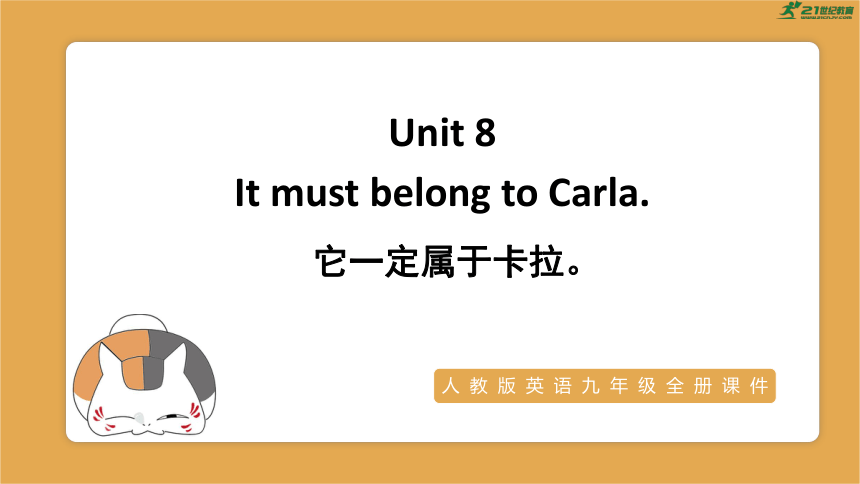 | |
| 格式 | pptx | ||
| 文件大小 | 1.3MB | ||
| 资源类型 | 试卷 | ||
| 版本资源 | 人教新目标(Go for it)版 | ||
| 科目 | 英语 | ||
| 更新时间 | 2023-12-11 22:34:54 | ||
图片预览

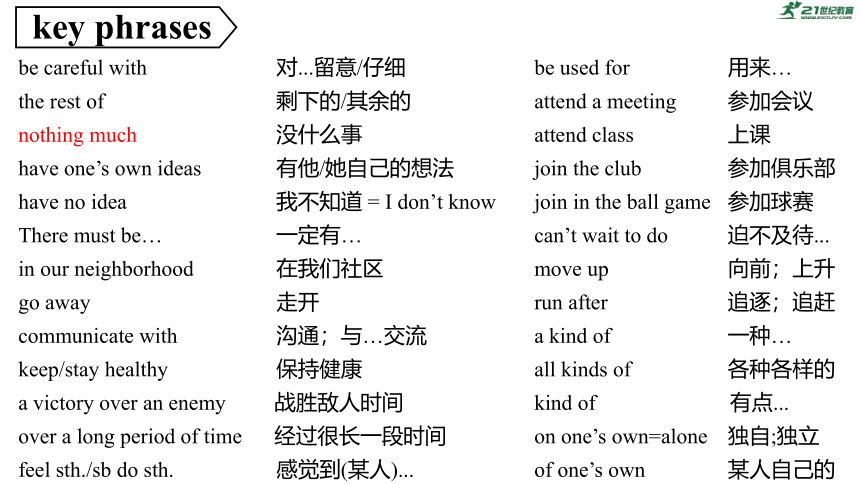
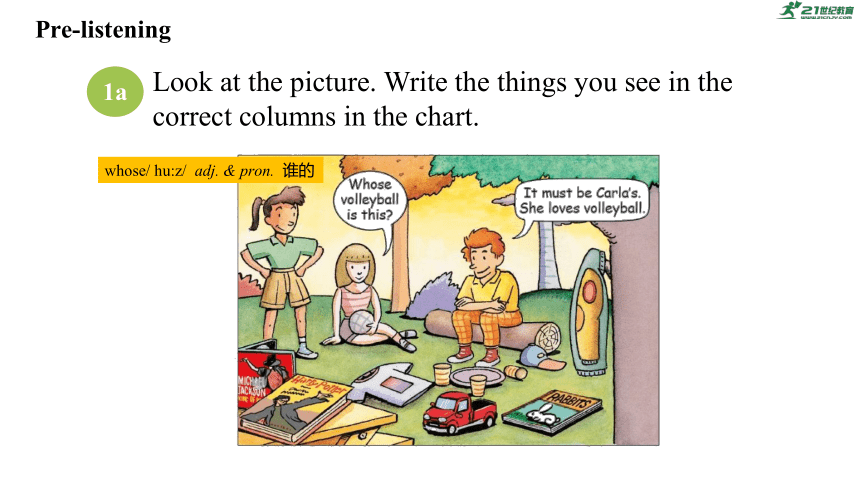
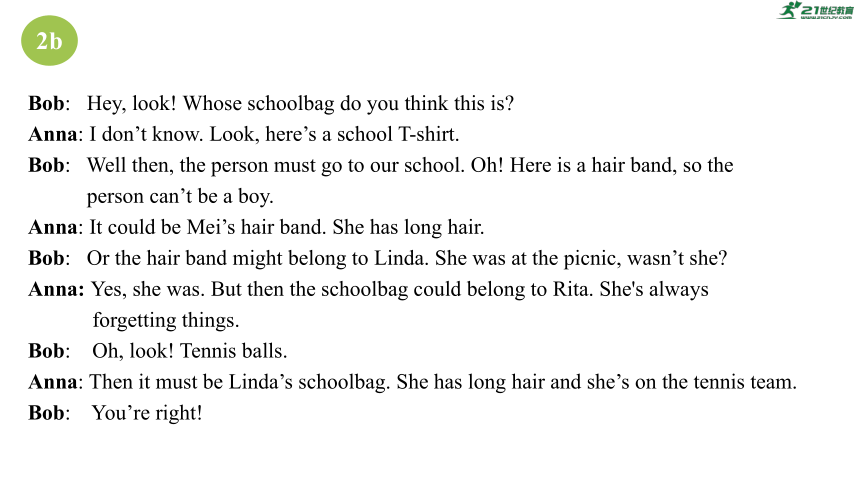
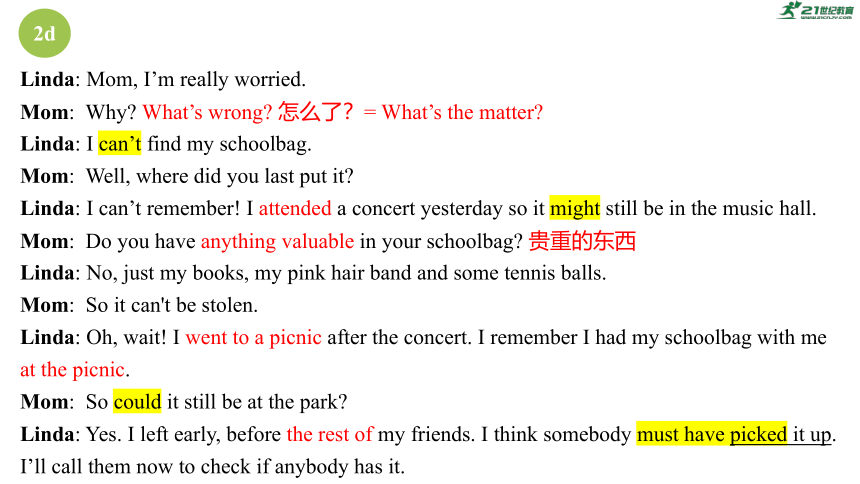
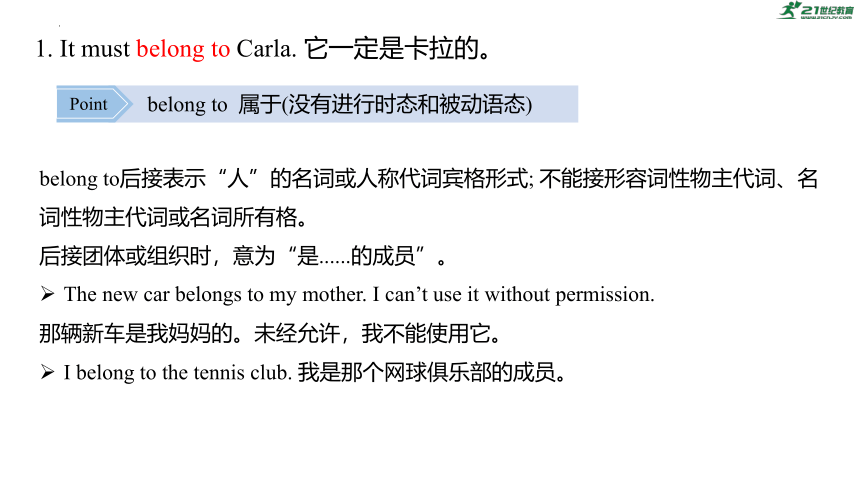
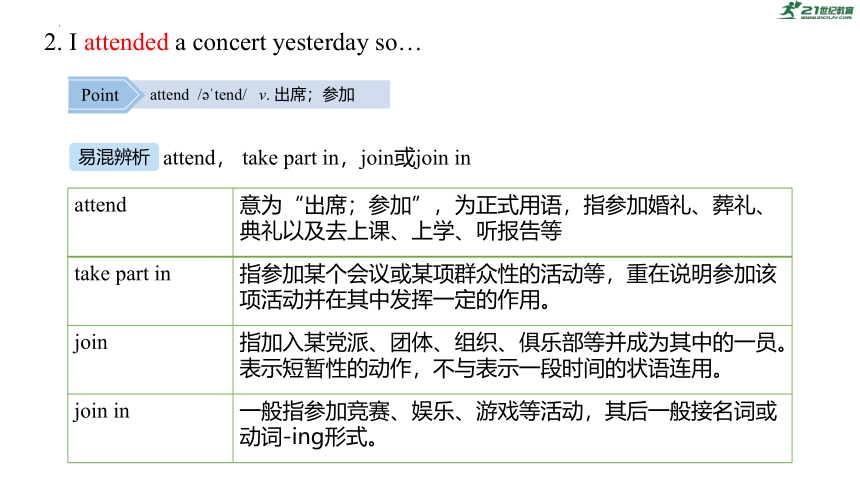
文档简介
(共16张PPT)
人教版英语九年级全册课件
Unit 8
It must belong to Carla.
它一定属于卡拉。
be careful with 对...留意/仔细 be used for 用来…
the rest of 剩下的/其余的 attend a meeting 参加会议
nothing much 没什么事 attend class 上课
have one’s own ideas 有他/她自己的想法 join the club 参加俱乐部
have no idea 我不知道 = I don’t know join in the ball game 参加球赛
There must be… 一定有… can’t wait to do 迫不及待...
in our neighborhood 在我们社区 move up 向前;上升
go away 走开 run after 追逐;追赶
communicate with 沟通;与…交流 a kind of 一种…
keep/stay healthy 保持健康 all kinds of 各种各样的
a victory over an enemy 战胜敌人时间 kind of 有点...
over a long period of time 经过很长一段时间 on one’s own=alone 独自;独立
feel sth./sb do sth. 感觉到(某人)... of one’s own 某人自己的
key phrases
Pre-listening
1a
Look at the picture. Write the things you see in the
correct columns in the chart.
whose/ hu:z/ adj. & pron. 谁的
2b
Bob: Hey, look! Whose schoolbag do you think this is
Anna: I don’t know. Look, here’s a school T-shirt.
Bob: Well then, the person must go to our school. Oh! Here is a hair band, so the
person can’t be a boy.
Anna: It could be Mei’s hair band. She has long hair.
Bob: Or the hair band might belong to Linda. She was at the picnic, wasn’t she
Anna: Yes, she was. But then the schoolbag could belong to Rita. She's always
forgetting things.
Bob: Oh, look! Tennis balls.
Anna: Then it must be Linda’s schoolbag. She has long hair and she’s on the tennis team.
Bob: You’re right!
2d
Linda: Mom, I’m really worried.
Mom: Why What’s wrong 怎么了?= What’s the matter
Linda: I can’t find my schoolbag.
Mom: Well, where did you last put it
Linda: I can’t remember! I attended a concert yesterday so it might still be in the music hall.
Mom: Do you have anything valuable in your schoolbag 贵重的东西
Linda: No, just my books, my pink hair band and some tennis balls.
Mom: So it can't be stolen.
Linda: Oh, wait! I went to a picnic after the concert. I remember I had my schoolbag with me at the picnic.
Mom: So could it still be at the park
Linda: Yes. I left early, before the rest of my friends. I think somebody must have picked it up. I’ll call them now to check if anybody has it.
belong to后接表示“人”的名词或人称代词宾格形式; 不能接形容词性物主代词、名词性物主代词或名词所有格。
后接团体或组织时,意为“是......的成员”。
The new car belongs to my mother. I can’t use it without permission.
那辆新车是我妈妈的。未经允许,我不能使用它。
I belong to the tennis club. 我是那个网球俱乐部的成员。
1. It must belong to Carla. 它一定是卡拉的。
belong to 属于(没有进行时态和被动语态)
Point
2. I attended a concert yesterday so…
attend / tend/ v. 出席;参加
Point
attend 意为“出席;参加”,为正式用语,指参加婚礼、葬礼、典礼以及去上课、上学、听报告等
take part in 指参加某个会议或某项群众性的活动等,重在说明参加该项活动并在其中发挥一定的作用。
join 指加入某党派、团体、组织、俱乐部等并成为其中的一员。表示短暂性的动作,不与表示一段时间的状语连用。
join in 一般指参加竞赛、娱乐、游戏等活动,其后一般接名词或动词-ing形式。
易混辨析
attend, take part in,join或join in
①常用于否定句和疑问句中,也可用于if引导的条件状语从句中。
Has anybody come?有人来了吗?
Please tell me at once if anybody calls me.假如有人给我打电话,请立刻告诉我。
②作主语时,谓语动词用单数形式。
Is anybody here?有人在吗?
③当形容词修饰不定代词时,形容词要后置。
Did you see anyone interesting?你见过有趣的人吗?
3. I'll call them now to check if anybody has it.
现在我要给他们打电话核实一下是否有人拿了它。
复合不定代词
Point
noise /n z/ n. 声音;噪音
Point
4. Every night we hear strange noises outside our window.(教材P59 3a)
noise既可作可数名词,又可作不可数名词,其形容词为noisy,意为“吵闹的;
嘈杂的”。make (a) noise 意为“制造噪声,发出声音”。
It’s noisy outside. Let’s go out and see who is making such (a) noise.
noise 多指不悦耳的吵闹声、嘈杂声,可与make连用。
sound 泛指能听见的自然界的各种声音,不带有任何感彩。
voice 多指人说话、唱歌的声音,不可与make连用。
They were making too much noise. 他们的声音太大了。
Does light travel faster than sound 光的传播速度比声音快吗?
Many teenagers love the singer because she has a sweet voice. 因为她的声音很甜。
noise-maker n. 噪音制造者
Point
5. The noise-maker is having too much fun creating …
noise-maker是一个复合名词,由“名词+名词”构成。这种复合构词法是英语中较为常见的一种构词方式,所构成的名词表达出原词语中的某种动宾关系,不仅可以用来指人,也可指物。在这类复合词中,两个名词中间有的用连字符“-”相连,有的没有,有的直接写成两个分开的词。
常见的有:
shopkeeper 店主 gatekeeper 看门人 bottle opener 开瓶器 taxi driver 出租车司机
suit n. 西服; 套装 v.适合; 适宜
Point
6. No, he's wearing a suit. 不,他正穿着西装。
suitable adj.适合的,适宜的 be suitable for 适合…
I think blue clothes suit her very well.我认为蓝色的衣服很适合她。
The toy is not suitable for young children.这个玩具不适合小孩玩。
【易混辨析】fit,suit与match
fit 多指衣服尺码、大小、形状合适(强调客观)
suit 多指样式、花色合适或指合乎某种条件(强调主观)
match 多指品质、颜色、设计等方面匹配,显得很协调
The suit fits you well, but its color doesn't suit you. And it doesn't match your shoes.
你穿这套西服很合身,但它的颜色不适合你。而且和你的鞋子不太搭。
point out 指出
Point
7. “The leaders arrived in England much later,”he points out.
他指出:“首领们到达英国的时间要晚得多。”
“动词+副词”型短语, 代词作宾语必须放两词中间, 名词作宾语可放中间也可放后面。
There is a mistake in this sentence.Can you point it out?这个句子中有一个错误,你能把它指出来吗?
I should point out that not one of these paintings is original. 我应当指出,这些画中没有一幅是真迹。
【拓展延伸】
point to 显示…的位置(侧重于所指的方向); 提出,指出 ; 暗示;预示
All the signs point to a successful year ahead. 一切迹象都预示着来年将一帆风顺。
point at 对准,指向; 针对 (侧重于所指的对象)
In discussing this problem, we ought to keep to the point at issue.
讨论这个问题时, 我们应该抓住分歧点.
There must be +主语+ doing sth. 有…正在做某事
Point
8. There must be something visiting the homes in our neighborhood, but what is it
一定有什么东西闯入了我们小区的住宅,但那会是什么呢?
对现在情况的肯定推测,意为“一 定有…...正在做某事”。
There must be someone waiting for you at the school gate. 学校门口一定有人在等你。
There are some children swimming in the swimming pool. 有一些孩子在游泳池里游泳。
must have+过去分词, 表示对过去事情的肯定推测,“一定做过某事”(只用于肯定句)
I think somebody must have picked it up.我想一定有人捡到了它。
否定推测要用can't have done,意为“不可能做过某事”。
句式 情态动词 含义 用法
肯定句 must 一定 表示有把握的肯定推测。变否定句时, 用can’t。He must be at home.
may/ might 也许; 可能 表示把握不大的肯定推测。might在推测语气中不表示过去, 语气更弱。
否定句 can’t/ couldn’t 不可能, 一定不 表示有把握的否定推测。
may not/might not 可能不 表示把握不大的否定推测。
疑问句 can/ could 可能, 能, 会 询问可能性,“会, 可能…吗?”could在推测语气中不表过去时, 更委婉。
情态动词表示推测
Grammar
推测某动作发生的可能时,must - can - could - may - might 把握程度依次递减。
基本结构:
对现在发生事情的推测: 情态动词 + do
对正在发生的事情的推测: 情态动词 + be doing
对过去的动作或状态的推测: 情态动词 + have done
The ground is wet. It must have rained last night. 地面很潮湿。昨晚一定下雨了。
情态动词 含义 例句
would have done 本会发生的结果 (却没有做) your grandmother would have hated this.
你奶奶一定不会喜欢这个的。(实际没发生)
should have done ought to have done 本该做某事 (却没有做) I should have gone to the party, but I was too busy.
我本该去聚会的,可是那时太忙了。(实际没去)
could have done 本能够做某事 (却没做成) I could have passed the exam if I had not been ill that day.
如果那天我不是病了的话, 我本能够通过考试的。(实际没通过)
couldn't have done 本不可能做成某事 (却做成了) I couldn't have succeeded without your help.
如果没有你的帮助,我不可能成功。(实际成功了)
needn't have done 本没必要做某事 (却做了) You needn't have bought such an expensive car.
你本没必要买这么贵的车。(实际买了)
虚拟语气(强调与过去事实相反)
as 因为,引导原因状语从句
Point
9. People like to go to this place especially in June as they want to see the sun rising on the longest day of the year.
人们尤其喜欢六月去那里,因为他们想在一年中白昼最长的一天看日出。
because 因为 (语气最强,用来回答why的提问)
since 因为;既然 (since的语气比because弱,比as略正式,表示显然的或对方已知的原因,即为已知事实提供理由。since引导的原因状语从句一般放在主句的前面。)
as 由于;因为 (语气最弱, 表示十分明显或对方已知的原因, 较为口语化)
—Why is she absent?她为什么缺席? —Because she is sick. 因为她病了。
Since she knows little English, she keeps to herself very much.
因为她不怎么懂英语,因此她很少与人交往。
We all like her as she is kind. 我们都喜欢她,因为她善良。
人教版英语九年级全册课件
Unit 8
It must belong to Carla.
它一定属于卡拉。
be careful with 对...留意/仔细 be used for 用来…
the rest of 剩下的/其余的 attend a meeting 参加会议
nothing much 没什么事 attend class 上课
have one’s own ideas 有他/她自己的想法 join the club 参加俱乐部
have no idea 我不知道 = I don’t know join in the ball game 参加球赛
There must be… 一定有… can’t wait to do 迫不及待...
in our neighborhood 在我们社区 move up 向前;上升
go away 走开 run after 追逐;追赶
communicate with 沟通;与…交流 a kind of 一种…
keep/stay healthy 保持健康 all kinds of 各种各样的
a victory over an enemy 战胜敌人时间 kind of 有点...
over a long period of time 经过很长一段时间 on one’s own=alone 独自;独立
feel sth./sb do sth. 感觉到(某人)... of one’s own 某人自己的
key phrases
Pre-listening
1a
Look at the picture. Write the things you see in the
correct columns in the chart.
whose/ hu:z/ adj. & pron. 谁的
2b
Bob: Hey, look! Whose schoolbag do you think this is
Anna: I don’t know. Look, here’s a school T-shirt.
Bob: Well then, the person must go to our school. Oh! Here is a hair band, so the
person can’t be a boy.
Anna: It could be Mei’s hair band. She has long hair.
Bob: Or the hair band might belong to Linda. She was at the picnic, wasn’t she
Anna: Yes, she was. But then the schoolbag could belong to Rita. She's always
forgetting things.
Bob: Oh, look! Tennis balls.
Anna: Then it must be Linda’s schoolbag. She has long hair and she’s on the tennis team.
Bob: You’re right!
2d
Linda: Mom, I’m really worried.
Mom: Why What’s wrong 怎么了?= What’s the matter
Linda: I can’t find my schoolbag.
Mom: Well, where did you last put it
Linda: I can’t remember! I attended a concert yesterday so it might still be in the music hall.
Mom: Do you have anything valuable in your schoolbag 贵重的东西
Linda: No, just my books, my pink hair band and some tennis balls.
Mom: So it can't be stolen.
Linda: Oh, wait! I went to a picnic after the concert. I remember I had my schoolbag with me at the picnic.
Mom: So could it still be at the park
Linda: Yes. I left early, before the rest of my friends. I think somebody must have picked it up. I’ll call them now to check if anybody has it.
belong to后接表示“人”的名词或人称代词宾格形式; 不能接形容词性物主代词、名词性物主代词或名词所有格。
后接团体或组织时,意为“是......的成员”。
The new car belongs to my mother. I can’t use it without permission.
那辆新车是我妈妈的。未经允许,我不能使用它。
I belong to the tennis club. 我是那个网球俱乐部的成员。
1. It must belong to Carla. 它一定是卡拉的。
belong to 属于(没有进行时态和被动语态)
Point
2. I attended a concert yesterday so…
attend / tend/ v. 出席;参加
Point
attend 意为“出席;参加”,为正式用语,指参加婚礼、葬礼、典礼以及去上课、上学、听报告等
take part in 指参加某个会议或某项群众性的活动等,重在说明参加该项活动并在其中发挥一定的作用。
join 指加入某党派、团体、组织、俱乐部等并成为其中的一员。表示短暂性的动作,不与表示一段时间的状语连用。
join in 一般指参加竞赛、娱乐、游戏等活动,其后一般接名词或动词-ing形式。
易混辨析
attend, take part in,join或join in
①常用于否定句和疑问句中,也可用于if引导的条件状语从句中。
Has anybody come?有人来了吗?
Please tell me at once if anybody calls me.假如有人给我打电话,请立刻告诉我。
②作主语时,谓语动词用单数形式。
Is anybody here?有人在吗?
③当形容词修饰不定代词时,形容词要后置。
Did you see anyone interesting?你见过有趣的人吗?
3. I'll call them now to check if anybody has it.
现在我要给他们打电话核实一下是否有人拿了它。
复合不定代词
Point
noise /n z/ n. 声音;噪音
Point
4. Every night we hear strange noises outside our window.(教材P59 3a)
noise既可作可数名词,又可作不可数名词,其形容词为noisy,意为“吵闹的;
嘈杂的”。make (a) noise 意为“制造噪声,发出声音”。
It’s noisy outside. Let’s go out and see who is making such (a) noise.
noise 多指不悦耳的吵闹声、嘈杂声,可与make连用。
sound 泛指能听见的自然界的各种声音,不带有任何感彩。
voice 多指人说话、唱歌的声音,不可与make连用。
They were making too much noise. 他们的声音太大了。
Does light travel faster than sound 光的传播速度比声音快吗?
Many teenagers love the singer because she has a sweet voice. 因为她的声音很甜。
noise-maker n. 噪音制造者
Point
5. The noise-maker is having too much fun creating …
noise-maker是一个复合名词,由“名词+名词”构成。这种复合构词法是英语中较为常见的一种构词方式,所构成的名词表达出原词语中的某种动宾关系,不仅可以用来指人,也可指物。在这类复合词中,两个名词中间有的用连字符“-”相连,有的没有,有的直接写成两个分开的词。
常见的有:
shopkeeper 店主 gatekeeper 看门人 bottle opener 开瓶器 taxi driver 出租车司机
suit n. 西服; 套装 v.适合; 适宜
Point
6. No, he's wearing a suit. 不,他正穿着西装。
suitable adj.适合的,适宜的 be suitable for 适合…
I think blue clothes suit her very well.我认为蓝色的衣服很适合她。
The toy is not suitable for young children.这个玩具不适合小孩玩。
【易混辨析】fit,suit与match
fit 多指衣服尺码、大小、形状合适(强调客观)
suit 多指样式、花色合适或指合乎某种条件(强调主观)
match 多指品质、颜色、设计等方面匹配,显得很协调
The suit fits you well, but its color doesn't suit you. And it doesn't match your shoes.
你穿这套西服很合身,但它的颜色不适合你。而且和你的鞋子不太搭。
point out 指出
Point
7. “The leaders arrived in England much later,”he points out.
他指出:“首领们到达英国的时间要晚得多。”
“动词+副词”型短语, 代词作宾语必须放两词中间, 名词作宾语可放中间也可放后面。
There is a mistake in this sentence.Can you point it out?这个句子中有一个错误,你能把它指出来吗?
I should point out that not one of these paintings is original. 我应当指出,这些画中没有一幅是真迹。
【拓展延伸】
point to 显示…的位置(侧重于所指的方向); 提出,指出 ; 暗示;预示
All the signs point to a successful year ahead. 一切迹象都预示着来年将一帆风顺。
point at 对准,指向; 针对 (侧重于所指的对象)
In discussing this problem, we ought to keep to the point at issue.
讨论这个问题时, 我们应该抓住分歧点.
There must be +主语+ doing sth. 有…正在做某事
Point
8. There must be something visiting the homes in our neighborhood, but what is it
一定有什么东西闯入了我们小区的住宅,但那会是什么呢?
对现在情况的肯定推测,意为“一 定有…...正在做某事”。
There must be someone waiting for you at the school gate. 学校门口一定有人在等你。
There are some children swimming in the swimming pool. 有一些孩子在游泳池里游泳。
must have+过去分词, 表示对过去事情的肯定推测,“一定做过某事”(只用于肯定句)
I think somebody must have picked it up.我想一定有人捡到了它。
否定推测要用can't have done,意为“不可能做过某事”。
句式 情态动词 含义 用法
肯定句 must 一定 表示有把握的肯定推测。变否定句时, 用can’t。He must be at home.
may/ might 也许; 可能 表示把握不大的肯定推测。might在推测语气中不表示过去, 语气更弱。
否定句 can’t/ couldn’t 不可能, 一定不 表示有把握的否定推测。
may not/might not 可能不 表示把握不大的否定推测。
疑问句 can/ could 可能, 能, 会 询问可能性,“会, 可能…吗?”could在推测语气中不表过去时, 更委婉。
情态动词表示推测
Grammar
推测某动作发生的可能时,must - can - could - may - might 把握程度依次递减。
基本结构:
对现在发生事情的推测: 情态动词 + do
对正在发生的事情的推测: 情态动词 + be doing
对过去的动作或状态的推测: 情态动词 + have done
The ground is wet. It must have rained last night. 地面很潮湿。昨晚一定下雨了。
情态动词 含义 例句
would have done 本会发生的结果 (却没有做) your grandmother would have hated this.
你奶奶一定不会喜欢这个的。(实际没发生)
should have done ought to have done 本该做某事 (却没有做) I should have gone to the party, but I was too busy.
我本该去聚会的,可是那时太忙了。(实际没去)
could have done 本能够做某事 (却没做成) I could have passed the exam if I had not been ill that day.
如果那天我不是病了的话, 我本能够通过考试的。(实际没通过)
couldn't have done 本不可能做成某事 (却做成了) I couldn't have succeeded without your help.
如果没有你的帮助,我不可能成功。(实际成功了)
needn't have done 本没必要做某事 (却做了) You needn't have bought such an expensive car.
你本没必要买这么贵的车。(实际买了)
虚拟语气(强调与过去事实相反)
as 因为,引导原因状语从句
Point
9. People like to go to this place especially in June as they want to see the sun rising on the longest day of the year.
人们尤其喜欢六月去那里,因为他们想在一年中白昼最长的一天看日出。
because 因为 (语气最强,用来回答why的提问)
since 因为;既然 (since的语气比because弱,比as略正式,表示显然的或对方已知的原因,即为已知事实提供理由。since引导的原因状语从句一般放在主句的前面。)
as 由于;因为 (语气最弱, 表示十分明显或对方已知的原因, 较为口语化)
—Why is she absent?她为什么缺席? —Because she is sick. 因为她病了。
Since she knows little English, she keeps to herself very much.
因为她不怎么懂英语,因此她很少与人交往。
We all like her as she is kind. 我们都喜欢她,因为她善良。
同课章节目录
- Unit 1 How can we become good learners.
- Section A
- Section B
- Unit 2 I think that mooncakes are delicious!
- Section A
- Section B
- Unit 3 Could you please tell me where the restroom
- Section A
- Section B
- Unit 4 I used to be afraid of the dark.
- Section A
- Section B
- Unit 5 What are the shirts made of?
- Section A
- Section B
- Review of Units 1-5
- Unit 6 When was it invented?
- Section A
- Section B
- Unit 7 Teenagers should be allowed to choose their
- Section A
- Section B
- Unit 8 It must belong to Carla.
- Section A
- Section B
- Unit 9 I like music that I can dance to.
- Section A
- Section B
- Unit 10 You're supposed to shake hands.
- Section A
- Section B
- Review of Units 6-10
- Unit 11 Sad movies make me cry.
- Section A
- Section B
- Unit 12 Life is full of the unexpected
- Section A
- Section B
- Unit 13 We're trying to save the earth!
- Section A
- Section B
- Unit 14 I remember meeting all of you in Grade 7.
- Section A
- Section B
- Review of Units 11-14
